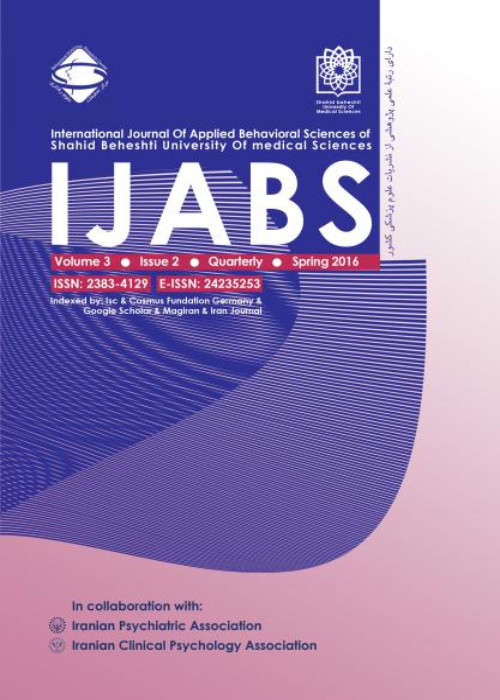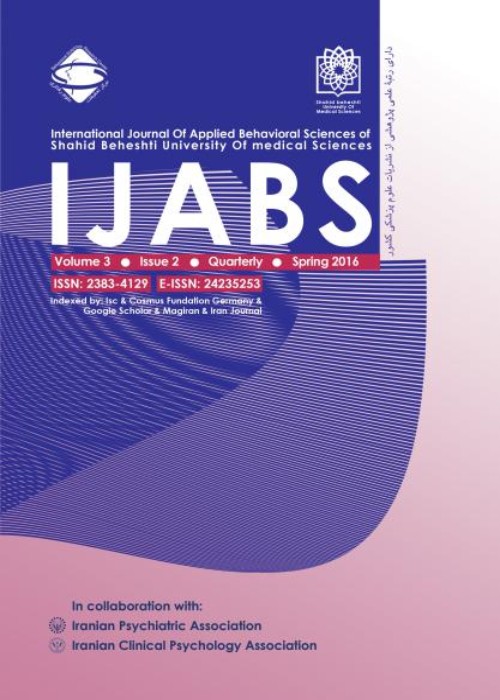فهرست مطالب

International Journal of Applied Behavioral Sciences
Volume:9 Issue: 4, Autumn 2022
- تاریخ انتشار: 1401/10/03
- تعداد عناوین: 5
-
-
Pages 1-8Background and Aim
COVID-19 has led to many psychological problems in the world. Mothers of children with intellectual disabilities may experience psychological problems, including suicidal ideation in the outbreak of COVID-19.This study aimed to evaluate the effectiveness of emotion regulation therapy (ERT) on suicide ideation among mothers of children with intellectual disabilities.
Materials and MethodsThe research method was quasi-experimental with experimental and control groups. The statistical population of this study consisted of all mothers of children with severe and profound intellectual disabilities in Razan city. 24 mothers with scores higher than the cut-off point (≥6) for the Beck Suicide Ideation Scale selected by convenience sampling method and were randomlyassigned in the experimental and control groups. The ERT was applied for the experimental group in 8 sessions, and the control group did not receive any training during the sessions. Analysis of covariance with repeated measures were used to analyze the data.
ResultsThe results showed that ERT was effective in reducing suicide ideation in caregiver mothers of children with intellectual disabilities (p<0.05).
ConclusionAccording to the results, the ERT is useful for reducing the suicide ideation in mothers of children with intellectual disabilities. ERT causes mothers to pay attention to their cognitive appraisal after awareness and acceptance of their negative emotions, and suicide ideation will decrease in them.
Keywords: Mothers, Emotion regulation, Intellectual disability, Suicide ideation -
Pages 9-16Background and Aim
Due to the high prevalence of emotional and cognitive problems among adolescents, paying attention to the emotional and cognitive problems of this population seems to be a necessity of society .Lack of paying attention to these problems leads to the persistence of these disorders in adulthood, therefore, the present study was conducted to evaluate the effectiveness of ERT based on the Gross model on adolescents.
Materials and MethodsThis study was a quasi-experimental research design involving 30 adolescents suffering from emotional problems. The used instruments included questionnaires of difficulty in emotion regulation, cognitive disturbance, and the Tower of London test. The assessment was performed in two stages including pre-test and post-test. SPSS-24 and one-way analysis of covariance were used to analyze the data.
ResultsThe results of one-way analysis of covariance showed that ERT was able to significantly improve the target variables of difficulty in emotion regulation, cognitive disturbance, and the Tower of London test.
ConclusionIt seems that using ERT based on the Gross model can improve the emotional problems of adolescents and prevent the occurrence of these problems among these people in adulthood.
Keywords: Emotional, cognitive problems, Adolescents, Emotion regulation -
Pages 17-25Background and Aim
The present study aimed to investigate the relationship between stress coping styles and pain perception of MS patientsduring the coronavirus outbreak with the mediating role of resilience. The coronavirus outbreak and its rapid global spread have created unprecedented challenges for health care systems, and patients with MS were no exception to these problems. Materialsand
MethodsThe research method was correlational using the path analysis method. The statistical population included all patients with relapsing-remitting multiple sclerosis (MS) referred to the MS Research Center of SINA Hospital in Tehran in 2020-2021.A total of 300 people were selected as the research sample through the purposive sampling method. The results were analyzed using path analysis with Amos software.
ResultsThe results showed a negative and significant relationship between stress coping styles and pain perception of MS patients during the coronavirus outbreak. The results showed that resilience had a moderating role in the relationship between stress coping styles and pain perception of patients with MS during the coronavirus outbreak (P<0.01).
ConclusionResilience regulates pain management and perception in MS patients by moderating and reducing tension. Therefore, it seems that it can reduce the pain perception during the coronavirus outbreak by reducing and adjusting coping styles against stress related to COVID-19. Instead of directly confronting the source of stress and dealing with its various aspects by ignoring and considering the issue unimportant, patients can significantly reduce their anxiety.
Keywords: Stress coping styles, Pain perception, Multiple Sclerosis, Coronavirus, Resilience -
Pages 26-34Background and Aim
Adequate sleep is considered as one of the physiological needs of human beings. In addition to adverse effects on physical and mental health, inadequate sleep can affect cognitive functions as well. Since night shifts are part of the main tasks of most clinical residents and are followed by changes in their sleep rhythm, this study investigated the changes in cognitive functioning of clinical residents following night shift work.
Materials and MethodsThis descriptive-correlational studywas conducted by convenient sampling method. So, 104 clinical residents were selected from seven different clinical specialties at Shahid Beheshti University of Medical Sciences hospitals. In order to investigate the cognitive function of the residents, the Demographic Questionnaire and Cognitive AbilitiesQuestionnaire were used in the beginning and end of the shifts. Data were analyzed using SPSS software and statistical tests such as the Paired T-test, Wilcoxon, independent T-test, the Spearman and Mann-Whitney.
ResultsAccording to statistical analysis, the mean score of memory scale at the end of the shift work was significantly different between different specialties (P<0.05). The difference in memory score changes at the end of the shift, compared tothe beginning of the shift, in non-surgical specialties was significant (P<0.05). It was also found that a significant relationship existed between the overnight sleep in the shift and the memory scale at the end of the shift (P<0.05).
ConclusionIn thisstudy, findings showed that night shift in various parameters, such as inadequate and inappropriate sleep, has caused changes in some cognitive function scales in different academic years and different clinical specialties. Differences in workload, job stress level, coping mechanisms and responsibility level could be the main reasons for these differences in different academic years and clinical specialties.
Keywords: Clinical Resident, Cognitive Function, Shift Work, Sleep -
Pages 35-43Background and Aim
Breast cancer is the most common malignancy diseases which is the leading cause of death in women with more than two million deaths per year. Pain in cancer patients has a complex relationship with adverse childhood experiences, attachment and social support, the multiple relationships of which has not been studied to date. The present study was conducted aimed to investigate the multiple dimensions of this relationship.
Materials and MethodsIn a cross-sectional study conducted in the form of a structural equation modeling, from July to September 2021 with 360 participants diagnosed with breast cancer who referred to three chemotherapy centers in Tehran were selected using purposeful sampling method and entered thestudy process after obtaining informed consent and fulfilling the assumed criteria. Four indicators of adverse childhood experiences, attachment style, pain, and perceived social support were completed by participants over a period of time. Data were analyzed using SPSS and Amos software version 25.
ResultsData analysis showed that adverse childhood experiences mediated by perceived social support was associated with the perception of pain in women with breast cancer (P<0.05). But the relationship between avoidant (β=0.015), safe (β=-.023) and ambivalent (β=0.026) attachment styles with pain perception was not significant and attachment styles through perceived social support could not have a significant effect on pain perception (P>0.05).
ConclusionSome of the findings of this study are in line with the research, indicating the relationship between adverse childhood experiences and pain perception and highlight the role of perceived social support. However, the relationship between attachment styles and pain perception is complex and requires further study.
Keywords: Breast cancer, Adverse childhood experiences, Attachment, Pain, Social support


